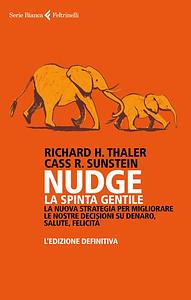Take a photo of a barcode or cover
I really missed the practical tips I expected from this book after reading the cover. It’s interesting knowledge, but some things I didn’t need to read two whole chapters about. A bit boring to be honest, but that’s probably partly because I’ve already read more books about these subjects. That’s also why I could skip a little bit every now and then.
I’ve read and would recommend the books THINKING FAST AND SLOW, ATOMIC HABITS and SAPIENS if you are interested in nudges or tips for improving your decisions about health, wealth and happiness, economics or human behaviour. These three books I thought were written better, very interesting and in general more fun to read.
But if you haven’t read these three yet, you’ll probably find a lot of interesting things in this one.
I’ve read and would recommend the books THINKING FAST AND SLOW, ATOMIC HABITS and SAPIENS if you are interested in nudges or tips for improving your decisions about health, wealth and happiness, economics or human behaviour. These three books I thought were written better, very interesting and in general more fun to read.
But if you haven’t read these three yet, you’ll probably find a lot of interesting things in this one.
Pretty practical and convincing book on ways we could design things to make life easier. I got a bit bored by the end but I think their policy prescriptions are generally compelling.
challenging
informative
slow-paced
DNF. Part of it might be that I have a fairly extensive background in one of the subjects that he spends a long time on, so it is a slog. This might be illuminating for some but I didn't find it engaging enough to see what comes next.
This didn’t live up to the hype for me. I read the first half, then started skimming, which I rarely ever do.
a lot of interesting anecdotes...similar to a Malcolm Gladwell book. unfortunately the purpose or takeaway was a little bit muddled. still worth a quick scan or read.
informative
medium-paced
informative
slow-paced
I liked how in-depth this was, and the specific suggestions about how to use 'nudges' for good decision making on a personal and an institutional level, but it was a lot drier than, say, 'Switch'.
This was a fine book, I just wish it were based consistently in psychological concepts rather than through the Libertarian paternalism perspective. Basic premise is small features of social situations can have massive effects on people’s behavior, nudges are everywhere. Choice architecture is unavoidable and greatly impacts our decisions.


